Pride and Prejudice (1940) Review
As someone who believes she’s seen “the” definitive version of Austen’s classic, Pride and Prejudice, a need to see all of the other versions is a moot point. I have my favored version of this timeless story (the burden of which sits upon the 2005 adaptation starring Keira Knightley) after all. That’s why watching any of the countless other adaptations pale in comparison. However, that’s not to say there aren’t enjoyable nuggets within this 1940 silver screen classic. There are, in fact, quite a few.
Anyone who is a classic cinema film buff coupled with being a period drama aficionado will appreciate this if only for the classic era of familiar faces. Taking on the iconic couple is Greer Garson and Laurence Olivier as Elizabeth Bennet and Mr. Darcy, two of the silver screen’s old Hollywood favorites.
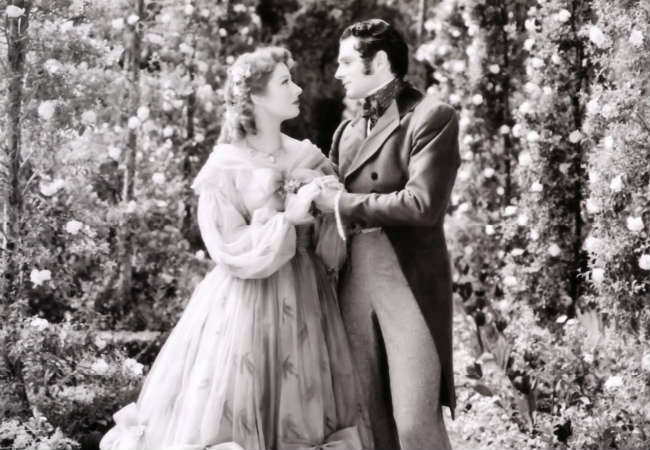
The script follows the gist of the classic story (Darcy falling for Elizabeth’s quick wit not to mention being the only man to manage both a romantic and insulting proposal) and all of the same players are intact with the exception of Georgiana Darcy who gets her name mentioned but never is given face. Everyone else, including the four additional personality-laced Bennet sisters, are present.
Personally, I have to separate this from being an Austen story; if I watch it as a classic film that tells a romantic comedy, cute-love-story, it’s much easier to accept. Considering it any other way with any other variations makes it difficult to take this one seriously. Nothing about the film is really authentic. The styling is more in the era of Gone with the Wind (billowed sleeves or off-shoulder gowns and lots of petticoats paired with bows and large millenary concoctions – a concession filmmakers made for more “ornate” costuming). Also, the characters meant to be less attractive are played by actresses who are anything but. This one also went through a lot of casting choices and potential faces, all of which is chronicled in an interesting read on TCM.
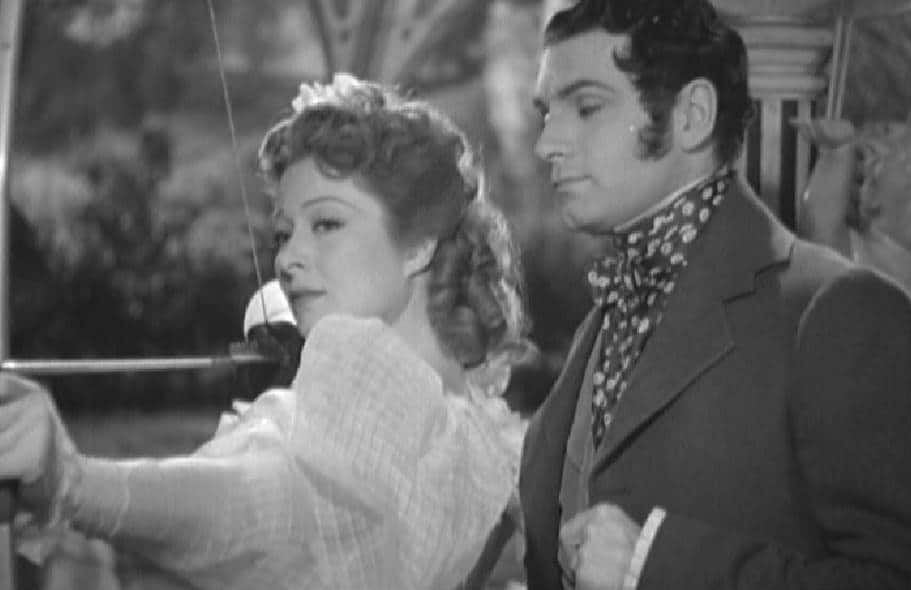
In short, I don’t think this works well as an adaptation of Pride and Prejudice. If judging the characters by their actions and living situations, no one is in the dire straits they should be. However, as a romantic comedy (which is really what this is – it doesn’t possess the same poignancy or serious politics of the era) this is cute. Lest my complaints suggest I didn’t like anything about this, that is far from true. It simply comes down to this: taking this seriously is impossible when we’re spoiled with two masterful adaptations. On its own merit, however, I do think it’s a sweet movie. Because it hails from the classic Hollywood genre, there are some dazzling details and I love the unique markers that make this version its own personality – namely Lizzie’s archery exhibition and the sassy ending involving Lady Catherine and Darcy’s ploy. For those reasons alone, this is a classic of its own kind.
Have you seen this version? What do you think of it? Do you have a favorite adaptation of Pride and Prejudice? Sound off below.
Photos: MGM
OVERALL RATING
“I think this is the beginning of a beautiful
friendship.”
ROMANCE RATING
(*A four because nothing can compare to the 2005 or 1995 adaptations with the romance)
“In vain have I struggled. It will not do. My
feelings will not be repressed. You must allow me
to tell you how ardently I admire and love you.”
You can rent Pride and Prejudice on Amazon Instant Video or just get the DVD:
ARE YOU A ROMANCE FAN? FOLLOW THE SILVER PETTICOAT REVIEW:
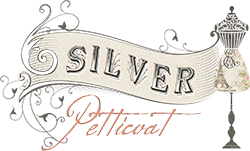 Our romance-themed entertainment site is on a mission to help you find the best period dramas, romance movies, TV shows, and books. Other topics include Jane Austen, Classic Hollywood, TV Couples, Fairy Tales, Romantic Living, Romanticism, and more. We’re damsels not in distress fighting for the all-new optimistic Romantic Revolution. Join us and subscribe. For more information, see our About, Old-Fashioned Romance 101, Modern Romanticism 101, and Romantic Living 101.
Our romance-themed entertainment site is on a mission to help you find the best period dramas, romance movies, TV shows, and books. Other topics include Jane Austen, Classic Hollywood, TV Couples, Fairy Tales, Romantic Living, Romanticism, and more. We’re damsels not in distress fighting for the all-new optimistic Romantic Revolution. Join us and subscribe. For more information, see our About, Old-Fashioned Romance 101, Modern Romanticism 101, and Romantic Living 101.

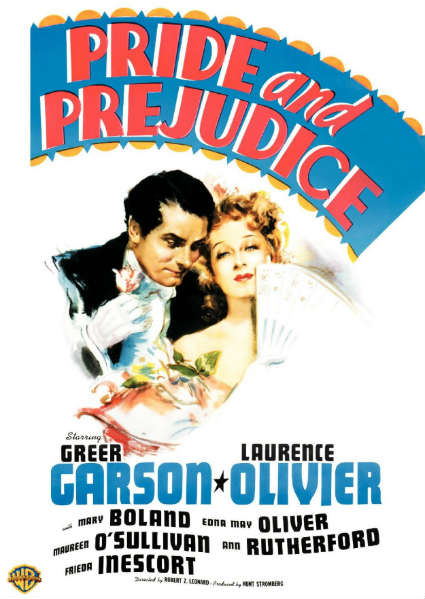
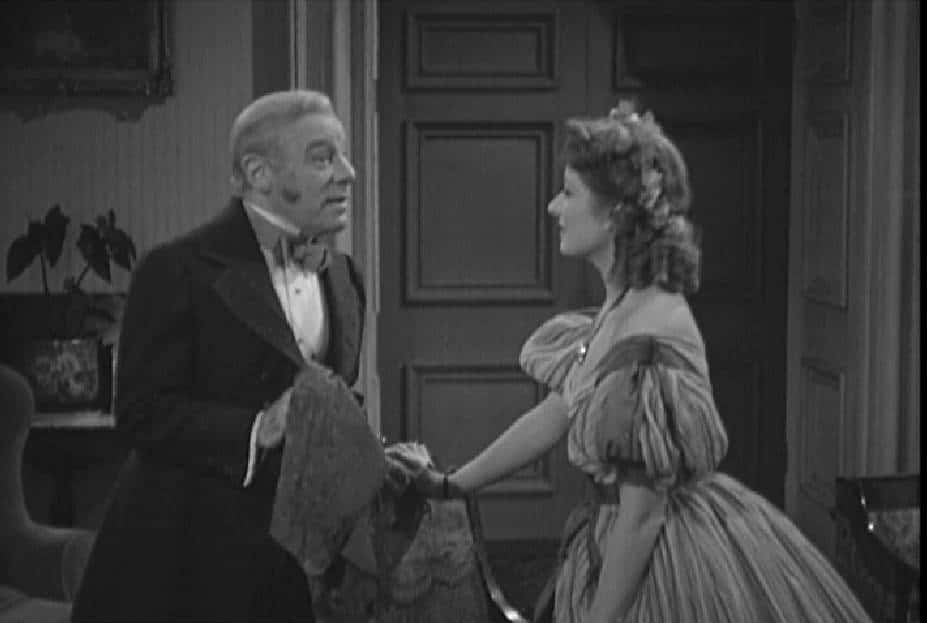
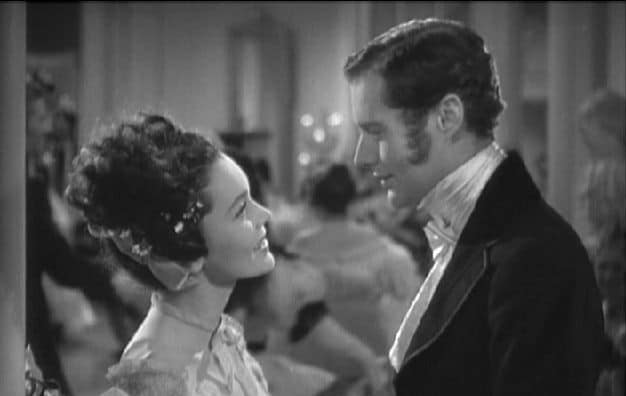
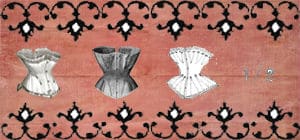

Yes, it’s definitely not an accurate adaptation, but still quite fantastic as a separate entity! Greer Garson is simply wonderful with a similar style of wit Jennifer Ehle would later incorporate in her own interpretation of the character. As a standalone the film works quite well though as an Austen adaptation it doesn’t quite match the source material. Still, it is incredibly funny and I always love Laurence Olivier. This is a film I can watch over and over.
I think if I separate this from being an Austen adaptation, I do quite enjoy it, Amber. It’s tough to remove Austen from the equation because the story is essentially her classic love/hate romance. As a 40s classic that’s a witty piece of filming, it’s cute. As a version of P&P, in comparison to the miniseries or 2005 film, it’s a tough sell. I’ve watched this one about three times now, and each time I do think I enjoy it a little more. Thanks for sharing your thoughts! 🙂
I find it very easy to latch onto a favorite adaptation and compare all others to it, so I hear you! Jane Eyre 2006!!! We all do it. That said, over time I learned how to watch various adaptations on their own merit as well, which helps with this film I think.
I let go of the fact that it’s not going to be just like the book or my favorite adaptation and appreciate it as someone’s interpretation. Each interpretation comes from the vision of the Director and how they interpret the story. It has their unique voice! I try to appreciate someone else’s interpretation of a story I love. (Though I can have some major disagreements with them for sure! And certainly some adaptations are objectively stinkers.) Plus, the time period a film or show is made also affects an adaptation because they bring out different universal themes from a story in different ways relevant to the time; kind of like folklore. And then I look at a classic film, for, instance, and watch it without a modern lens. I like to read classic books from the past that way too. But that’s just me!
Personally, I believe different adaptations speak to different people for various reasons! It’s fascinating seeing how people debate over what is their favorite version of a classic brought to the screen. I think it comes down to voice and which voice most closely matches our own. How we feel about a story! Just my rambling thoughts though on something we all do. So, as a separate entity I think Pride and Prejudice 1940 is a strong film even though it makes some hilarious departures from the book. 🙂
Me too, Amber. Me too! It’s easy to do I think… and as you say, we all do it. 🙂 I’m not sure if I’ve seen the 2006 adaptation of Jane Eyre yet… I’ll have to check because I know there is one I still need to see.
To be fair, I’m not comparing this to the book but rather the other adaptations which is perhaps the least accurate thing to do. But given how well the miniseries adapts the book (my mom read the book and says it’s excellent as an adaptation), I suppose that’s where my personal thoughts partially stem from. You have an excellent grasp on how to look at films as adaptations. Generally I’m not critical either, especially if I like a film. As you say, it’s interesting to watch how someone interprets the story (even we, as viewers see things other don’t or take something away no one else does).
Personally, I believe different adaptations speak to different people for various reasons!” = YES! It is. I love discussing films with people, even with differing opinions. I enjoy a good discussion so long as that’s what it is; a good agree-to-disagree discussion. 🙂
Well said. I agree 100%! I do enjoy this one separate from my favorites and for that reason alone, I do feel it’s a great classic. 🙂
There are only four straight adaptations of “PRIDE AND PREJUDICE” that I have truly enjoyed – the 1940 version with Greer Garson and Laurence Olivier, the 1980 version with Elizabeth Garvie and David Rintoul; the 1995 version with Jennifer Ehle and Colin Firth; and the 2005 version with Keira Knightley. All are enjoyable to me and none of them are completely faithful.
There are also two other productions about “PRIDE AND PREJUDICE” that I have truly enjoyed – 2008’s “LOST IN AUSTEN” with Jemima Rooper and Elliot Cowan, and 2013’s “DEATH COMES TO PEMBERLY” with Anna Maxwell-Martin and Matthew Rhys.
I adore the 2005 adaptation, Rosie. 🙂 I realize it’s (likely) less faithful than the miniseries but it’s just… so pretty, and well acted/directed.
I also enjoyed “Lost in Austen” (so much sassy fun!) and of course, “Death Comes to Pemberley” is really good too. Thanks for sharing your thoughts.
I wholeheartedly agree with your review. This was the first version of P&P I ever watched and therefore I have always really enjoyed it even after watching the more accurate versions. Plus, I’m a big classic film fan.
Thanks, Brittaney! I’m glad you shared your thoughts. 🙂 I suspect any classic film fan will enjoy this one, no matter what. This one does have all of that classic 40s wit, which certainly brings lots of smiles when watching it.
I haven’t seen this version for years, but I remember enjoying it. I think it was the first time I saw Greer Garson in a movie, and I loved her in it. I agree that she is excellent as Elizabeth, and though my memory is fuzzy that archery scene stuck with me. I just see this movie as an adaptation of the novel, and so the changes don’t really bother me. I have to disagree with you on your point about attractive actresses playing the “unattractive” people – not because you’re wrong, but because that’s pretty standard in most movies I think. 😀 Even in the other versions of P&P. I thought Charlotte in the 1995 mini series was not so terribly plain for example.
It’s a cute little adaptation to watch, Dixie-Ann! I smiled and giggled my way through, and for some reason, love that archery scene. Perhaps because it’s classic Elizabeth Bennet. 😀 I agree about the standard of pretty actresses playing unattractive people, especially in this era of filmmaking. I suppose I should have expressed my thought a bit differently. I don’t necessarily think the actresses that have played “plain” characters in later versions were unattractive either, but the make up artists did their job better; they styled the actresses to make them look less attractive rather than style them as beautifully as those who are supposed to be pretty. 🙂